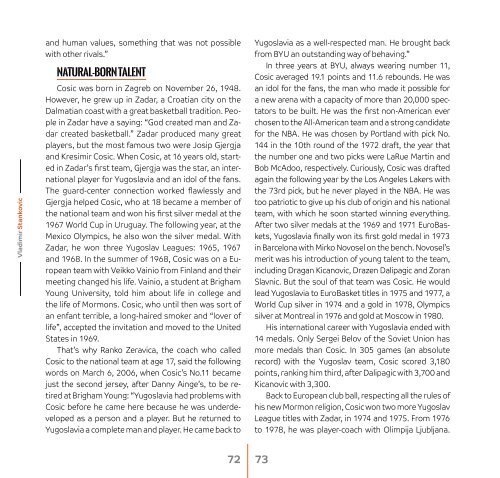101 Greats of European Basketball
Create successful ePaper yourself
Turn your PDF publications into a flip-book with our unique Google optimized e-Paper software.
Vladimir Stankovic<br />
and human values, something that was not possible<br />
with other rivals.”<br />
Natural-born talent<br />
Cosic was born in Zagreb on November 26, 1948.<br />
However, he grew up in Zadar, a Croatian city on the<br />
Dalmatian coast with a great basketball tradition. People<br />
in Zadar have a saying: “God created man and Zadar<br />
created basketball.” Zadar produced many great<br />
players, but the most famous two were Josip Gjergja<br />
and Kresimir Cosic. When Cosic, at 16 years old, started<br />
in Zadar’s first team, Gjergja was the star, an international<br />
player for Yugoslavia and an idol <strong>of</strong> the fans.<br />
The guard-center connection worked flawlessly and<br />
Gjergja helped Cosic, who at 18 became a member <strong>of</strong><br />
the national team and won his first silver medal at the<br />
1967 World Cup in Uruguay. The following year, at the<br />
Mexico Olympics, he also won the silver medal. With<br />
Zadar, he won three Yugoslav Leagues: 1965, 1967<br />
and 1968. In the summer <strong>of</strong> 1968, Cosic was on a <strong>European</strong><br />
team with Veikko Vainio from Finland and their<br />
meeting changed his life. Vainio, a student at Brigham<br />
Young University, told him about life in college and<br />
the life <strong>of</strong> Mormons. Cosic, who until then was sort <strong>of</strong><br />
an enfant terrible, a long-haired smoker and “lover <strong>of</strong><br />
life”, accepted the invitation and moved to the United<br />
States in 1969.<br />
That’s why Ranko Zeravica, the coach who called<br />
Cosic to the national team at age 17, said the following<br />
words on March 6, 2006, when Cosic’s No.11 became<br />
just the second jersey, after Danny Ainge’s, to be retired<br />
at Brigham Young: “Yugoslavia had problems with<br />
Cosic before he came here because he was underdeveloped<br />
as a person and a player. But he returned to<br />
Yugoslavia a complete man and player. He came back to<br />
Yugoslavia as a well-respected man. He brought back<br />
from BYU an outstanding way <strong>of</strong> behaving.”<br />
In three years at BYU, always wearing number 11,<br />
Cosic averaged 19.1 points and 11.6 rebounds. He was<br />
an idol for the fans, the man who made it possible for<br />
a new arena with a capacity <strong>of</strong> more than 20,000 spectators<br />
to be built. He was the first non-American ever<br />
chosen to the All-American team and a strong candidate<br />
for the NBA. He was chosen by Portland with pick No.<br />
144 in the 10th round <strong>of</strong> the 1972 draft, the year that<br />
the number one and two picks were LaRue Martin and<br />
Bob McAdoo, respectively. Curiously, Cosic was drafted<br />
again the following year by the Los Angeles Lakers with<br />
the 73rd pick, but he never played in the NBA. He was<br />
too patriotic to give up his club <strong>of</strong> origin and his national<br />
team, with which he soon started winning everything.<br />
After two silver medals at the 1969 and 1971 EuroBaskets,<br />
Yugoslavia finally won its first gold medal in 1973<br />
in Barcelona with Mirko Novosel on the bench. Novosel’s<br />
merit was his introduction <strong>of</strong> young talent to the team,<br />
including Dragan Kicanovic, Drazen Dalipagic and Zoran<br />
Slavnic. But the soul <strong>of</strong> that team was Cosic. He would<br />
lead Yugoslavia to EuroBasket titles in 1975 and 1977, a<br />
World Cup silver in 1974 and a gold in 1978, Olympics<br />
silver at Montreal in 1976 and gold at Moscow in 1980.<br />
His international career with Yugoslavia ended with<br />
14 medals. Only Sergei Belov <strong>of</strong> the Soviet Union has<br />
more medals than Cosic. In 305 games (an absolute<br />
record) with the Yugoslav team, Cosic scored 3,180<br />
points, ranking him third, after Dalipagic with 3,700 and<br />
Kicanovic with 3,300.<br />
Back to <strong>European</strong> club ball, respecting all the rules <strong>of</strong><br />
his new Mormon religion, Cosic won two more Yugoslav<br />
League titles with Zadar, in 1974 and 1975. From 1976<br />
to 1978, he was player-coach with Olimpija Ljubljana.<br />
72<br />
73
















